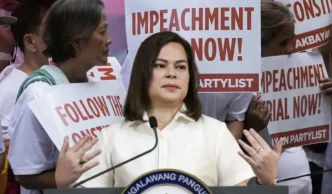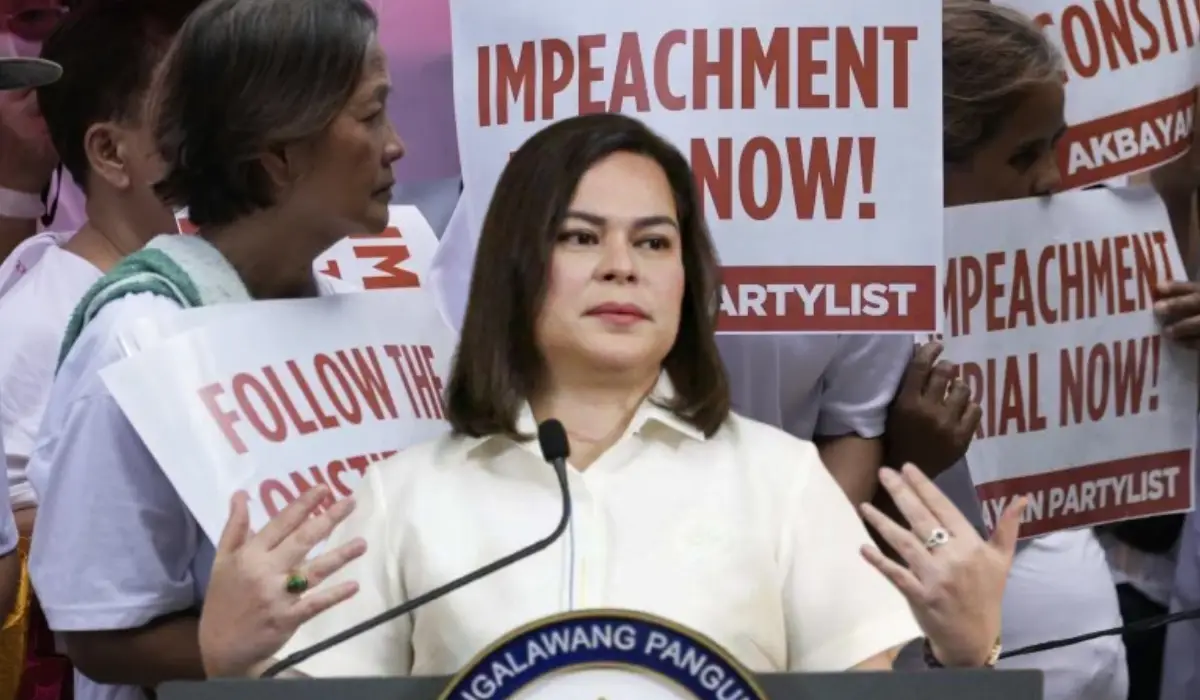Vice President Sara Duterte has mounted a robust defense against the impeachment proceedings initiated against her, urging the Philippine Senate, sitting as an impeachment court, to dismiss the charges as baseless and unconstitutional. In a last-minute submission on June 24, 2025, Duterte described the articles of impeachment as “nothing more than a scrap of paper,” arguing that they violate constitutional limits on multiple filings within a year and lack substantive evidence. Her response, filed just before the deadline, intensifies an already contentious political battle in Manila, raising questions about the integrity of the impeachment process and the broader implications for governance in the Philippines.
Impeachment Complaint Under Fire
Duterte’s 34-page answer, submitted ad cautelam (with caution), contends that the fourth impeachment complaint, endorsed by 215 House lawmakers on February 5, 2025, should be declared “void ab initio” (invalid from the start). She argues that the complaint breaches the constitutional prohibition against filing more than one impeachment case against an official within a 12-month period. This echoes her ongoing petition before the Supreme Court, where she seeks to halt the trial entirely. “There are no statements of ultimate facts in the fourth impeachment complaint” said Duterte, emphasizing that the document lacks concrete evidence and is merely a collection of unsupported legal and factual conclusions.
The allegations against Duterte are severe, encompassing a culpable violation of the Constitution, betrayal of public trust, and graft and corruption. Central to the complaint is her alleged misuse of 612.5 million Philippine Pesos (US$10.5 million) in confidential funds during her tenure as head of the Department of Education and as Vice President. Additionally, an online rant from November 2024, in which she purportedly threatened the assassination of President Ferdinand Marcos Jr., First Lady Liza Araneta-Marcos, and House Speaker Martin Romualdez, has fueled accusations of misconduct. While Duterte has not directly addressed the specifics of these claims in her Senate submission, her legal team insists the impeachment process itself is flawed and abusive.
Legal and Procedural Complexities
The timing of Duterte’s response—received by Senate Secretary Renato Bantug Jr. at 5:49 p.m. on June 24, just minutes before the deadline—underscores the high stakes of the case. Her legal representation, comprising 16 lawyers from the Fortun Narvasa & Salazar firm, also delivered a copy of the response to the House of Representatives earlier that day, signaling a coordinated effort to challenge the proceedings on multiple fronts. The Vice President’s arguments hinge on procedural irregularities, a tactic that legal analysts suggest could delay or derail the trial if the Senate tribunal finds merit in her claims of constitutional overreach.
Adding another layer of complexity is the involvement of the Ombudsman, Samuel Martires, who directed Duterte to respond to separate charges of fund misappropriation filed by House lawmakers on June 16. Manila Representative Joel Chua, a member of the House prosecution team, highlighted a potential conflict between existing jurisprudence and the current case. Citing a 1995 Supreme Court ruling in a case involving then-Ombudsman Aniano Desierto, Chua noted that impeachable officials must first be removed via impeachment before facing criminal or administrative charges. “From what I understand, we must first wait for the outcome of the impeachment trial before other related charges are filed” said Chua, expressing uncertainty about how the Ombudsman’s actions might intersect with the Senate’s decision.
Chua also suggested that the Ombudsman could focus initially on other respondents named in the charges against Duterte, avoiding direct action against her until the impeachment process concludes. However, he refrained from speculating on Martires’ intentions, noting only that the Ombudsman may have identified probable cause in the allegations of misused confidential funds. This parallel investigation raises significant questions about the sequencing of legal accountability for high-ranking officials in the Philippines, a nation where political and judicial processes often intersect with dramatic consequences.
Political Context and Public Reaction
The impeachment case against Sara Duterte unfolds against a backdrop of intense political rivalry and public scrutiny. As the daughter of former President Rodrigo Duterte, whose administration was marked by controversial policies and a strongman approach, Sara has inherited both a powerful political legacy and significant opposition. Her tenure as Vice President, coupled with her previous role at the Department of Education, has placed her under a microscope, with critics alleging mismanagement and abuse of power. The accusation regarding her online rant, if substantiated, could further erode public trust, though no definitive evidence has been presented in the public domain to confirm the context or authenticity of her statements.
The misuse of confidential funds, a recurring issue in Philippine politics, strikes a particular chord with citizens weary of corruption scandals. Confidential funds, intended for sensitive government operations, have historically been a source of contention due to limited transparency in their allocation and expenditure. Duterte’s alleged misappropriation of over 612 million pesos (US$10.5 million) has drawn ire from lawmakers and civil society groups alike, who argue that such funds must be accounted for, especially when tied to educational institutions meant to serve the public good. If these allegations are proven, they could set a precedent for stricter oversight of discretionary budgets across government agencies.
Public sentiment, as reflected in social media discussions and local media reports, appears divided. Supporters of Duterte argue that the impeachment is a politically motivated attack, orchestrated by rivals seeking to undermine her influence ahead of future elections. Critics, however, view the proceedings as a necessary check on power, emphasizing the importance of holding even the highest officials accountable. The Senate tribunal’s handling of the case will likely shape public perceptions of impartiality within the country’s political institutions, a critical factor in a democracy often tested by factionalism and patronage.
Broader Implications for Philippine Governance
Beyond the specifics of Duterte’s case, the impeachment trial raises fundamental questions about the balance of power and accountability mechanisms in the Philippines. The constitutional limit on multiple impeachment filings within a year, invoked by Duterte, is designed to prevent harassment of officials through repetitive legal challenges. However, it also risks shielding individuals from legitimate scrutiny if interpreted too rigidly. Legal scholars note that the Senate’s interpretation of this provision could set a lasting precedent, influencing how future impeachment cases are initiated and adjudicated.
Moreover, the intersection of impeachment proceedings with criminal investigations by the Ombudsman highlights a gap in the legal framework governing high-ranking officials. The 1995 Supreme Court ruling cited by Representative Chua suggests a sequential approach—impeachment before prosecution—but the practical application of this principle remains unclear in Duterte’s case. Should the Ombudsman issue a decision before the Senate tribunal concludes its trial, it could trigger a constitutional crisis, forcing the Supreme Court to intervene and clarify the hierarchy of accountability processes.
The political ramifications are equally significant. Sara Duterte remains a polarizing figure, with a strong base of support rooted in her family’s political dynasty and her alignment with populist policies. Her potential removal from office could reshape the landscape ahead of the 2028 presidential elections, where she is widely seen as a contender. Conversely, a dismissal of the impeachment charges might embolden her administration and allies, reinforcing perceptions of impunity among critics. The outcome of this trial, therefore, extends far beyond the Vice President’s personal fate, touching on issues of democratic integrity, institutional trust, and the rule of law.
Looking Ahead
As the Senate tribunal prepares to deliberate on Sara Duterte’s motion to dismiss, the nation watches closely for signs of fairness and due process. The coming weeks will test the resilience of the Philippines’ political and judicial systems, with potential ripple effects across Southeast Asia, where governance challenges often mirror one another. Whether the impeachment complaint is upheld or thrown out, the debate over accountability, transparency, and the use of public funds is unlikely to fade, leaving an indelible mark on the country’s democratic journey.
















